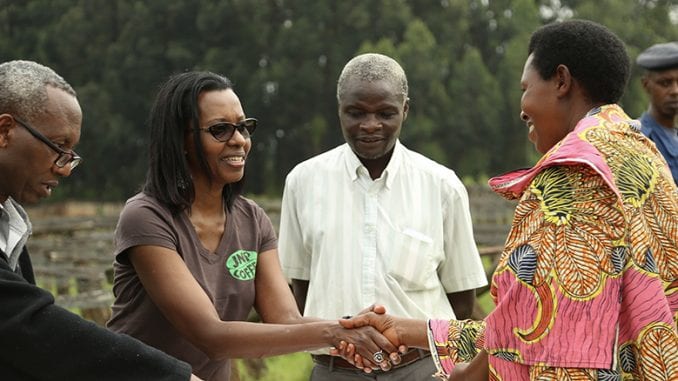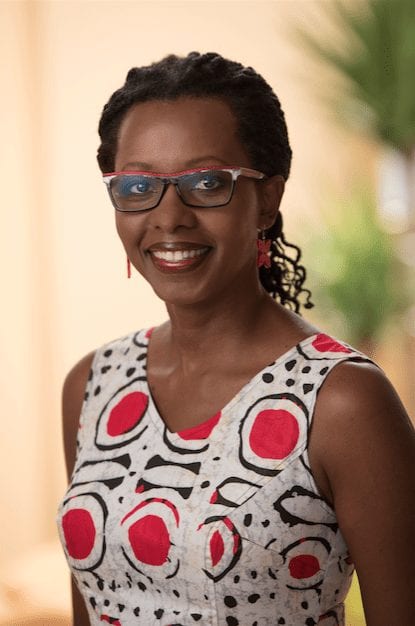
We chat with JNP Coffee’s owner and manager about Burundi coffee and her work in the industry.
BY VALORIE CLARK
SPECIAL TO BARISTA MAGAZINE ONLINE
Photos courtesy of Jeanine Niyonzima
In April, we sat down with Jeanine Niyonzima, owner of JNP Coffee. Before the COVID-19 crisis set in, Jeanine was a featured speaker at the Re:co Symposium, scheduled to give a talk titled “Critical Collaboration at Origin.” While the talk couldn’t happen this year, we checked in with Jeanine to find out more about her work, how she believes we can support farmers better, and the beauty of Burundi’s coffee.

This conversation has been condensed and edited for clarity.
Valorie Clark: What are your earliest memories of coffee?
Jeanine Niyonzima: As a child growing up in Burundi, my mom always used to tell us the story about how her family used to grow coffee in Ngozi Province, which is in the north of Burundi. She would tell us how the whole family used to help harvest the crop, and how the money they were able to receive helped pay for school for her and her siblings.
I was very lucky to come to the U.S. and receive an education. That’s when I started really drinking coffee, to stay up late at night and do my studying. But somehow, years later, I attended Cup of Excellence and tasted Burundi coffee, and that’s really where JNP Coffee started. The work that we’re doing right now to create sustainable solutions for coffee farmers in Burundi is where the circle became complete for me.
I understand you founded Burundi Friends International in 2007 and JNP Coffee in 2012 to help promote the Burundi coffee industry. What drew you to working in the coffee industry?
I started Burundi Friends International out of San Diego, where I used to live. The mission was to unite and educate youth, women, and men leading to economic empowerment and building self-sustaining communities in Burundi. Then I later discovered, almost by accident, the uniqueness of Burundi coffee. Burundi is such a small country and just beautiful—surrounded by high mountains and a very unique people. Burundi produces some of the most amazing coffee …
To me, I very quickly realized that this uniqueness of Burundi coffee needed to be brought into the world market. And that coffee was another avenue that we could use to lift people out of poverty. Burundi is one of the poorest countries in the world, which is why when I built BFi and with all of my work in coffee, I’m constantly trying to address the needs of people and doing things to lift them out of poverty. So when I created JNP Coffee in 2012, the focus was on building a business based on the quality and potential of Burundi coffee. The farmers are also our partners. We share the success of our earnings through financial premiums that go back to the farmers.
The talk you were going to give at Re:co is titled “Critical Collaboration at Origin.” In the description it mentioned that success at the farm level doesn’t just look like paying farmers more. So how do you define success for farmers?
Success is determined by the people in our program, their ability to improve their lives and create sustainable communities. Sustainability and collaboration at the core of our work, and we work with other organizations that provide social capital and networks to support this goal. For us, we had to look at the challenges and solutions for the farmers in a more holistic approach. We realized you can’t just give money and walk away, and hope that they’ll resolve their challenges.
In places like Burundi, most farmers have very little education. And most women who take on most of the chores at the farms have no ownership, and don’t get much appreciation for their efforts. It’s something most people don’t realize, and hopefully JNP Coffee can bring this to the eyes of the consumer.
So success was based on taking sustainability approaches and collaborating with others. We know farmers have to be trained to ensure that they have high production and a high-quality cup of coffee. Being able to partner with women farmers ensured that we are able to build lasting and strong communities in Burundi. In addition to that, providing financial literacy education and leadership training also assured us that our farmers and partners can build diverse businesses instead of just relying on just one seasonal crop. We have to realize, coffee is just one harvest (in Burundi it’s June to July) and then they have to go back to other things; other crops, other businesses. We realized that if we can help them to be more diverse and provide the education that they lack, we are also providing a solution for them to be able to grow and build other businesses.
We collaborate with other organizations, like Burundi Friends International and Project Concern International, to magnify our efforts and create opportunities to prepare the farmers to achieve success in their own lives. Together we provide them with the tools to learn leadership skills and how to manage money, which we realized was extremely important and was missing in the approach of having them just produce good coffee and roasters paying good money for the coffee.
What is one major thing you hope people would have taken away from your talk at Re:co?
It’s not enough to just pay farmers more money. We need to collaborate and start joining forces wherever possible to create a more sustainable supply chain, because we are all here to make a difference.

ABOUT THE AUTHOR
Valorie Clark (@TheValorieClark) is a freelance writer with a background in specialty coffee. She is based in Los Angeles.

